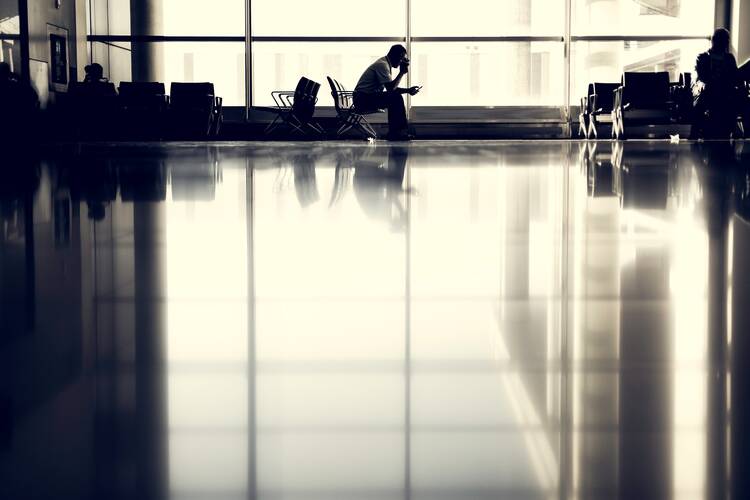It is in the nature of genius to reset the routine in a way that is revelatory. In one paragraph of her novel The Lost Children Archive, Valeria Luiselli offers compassionate insight by working with a very common word: wait. Whatever your political stance on border control and immigration, try to imagine what it would be like to choose between your home and your life and then...to wait.
In the novel, a husband and wife travel across the country with two small children, constantly seeking ways to avoid hearing the dreaded phrase, “How much longer?” Listening to a news feature on refugee children, the 5-year-old girl asks her mother what the word “refugee” means.
I look for possible answers to give her. I suppose that someone who is fleeing is still not a refugee. A refugee is someone who has already arrived somewhere, in a foreign land, but must wait for an indefinite time before actually, fully having arrived. Refugees wait in detention centers, shelters, or camps; in federal custody and under the gaze of armed officials. They wait in long lines for lunch, for a bed to sleep in, wait with their hands raised to ask if they can use the bathroom. They wait to be let out, wait for a telephone call, for someone to claim or pick them up. And then there are refugees who are lucky enough to be finally reunited with their families, living in a new home. But even those still wait. They wait for the court’s notice to appear, for a court ruling, for either deportation or asylum, wait to know where they will end up living and under what conditions. They wait for a school to admit them, for a job opening, for a doctor to see them. They wait for visas, documents, permission. They wait for a cue, for instructions, and then wait some more. They wait for their dignity to be restored.
What does it mean to be a refugee? I suppose I could tell the girl: A child refugee is someone who waits.
The Gospels do not record any opening statements from Jesus as he emerges from the tomb. Yet surely the significance of what happened on Calvary and in the burial cave is captured by the cosmic Christ of the Book of Revelation, who says, “Behold, I make all things new” (21:5).
The newness of eternal life is hard to envision. Lost in this world, we have little idea what would truly make us happy.
The truly new, the really novel, is a challenge for the imagination. The reality of hell should be easy enough to picture. Aren’t our lives suffused with sufferings born of sin? The newness of eternal life, however, is much harder to envision. Lost in this world, we have little idea what would truly make us happy, really grant us contentment.
Ms. Luiselli suggests that “we feel time differently” than our forebears because we are overwhelmed by the day-to-day demands of the present:
No one has been quite able to capture what is happening or say why. Perhaps it’s just that we sense an absence of the future, because the present has become too overwhelming, so the future has become unimaginable. And without future, time feels like only an accumulation. An accumulation of months, days, natural disasters, television series, terrorist attacks, divorces, mass migrations, birthdays, photographs, sunrises. We haven’t understood the exact way we are now experiencing time.
Small wonder that the afterlife is such a challenge for our imaginations. Overwhelmed in the present, we have lost all feel for the future. So let’s say this of eternal life: It is where waiting comes to an end.
Summon up your intelligence and your compassion to reflect upon all of the waiting going on each day in our world. Human hearts are hungering for heaven, waiting for the Lord to “make all things new.”
Some wait for justice, some for a cure, some for rest and some for reconciliation. Some wait for the pain of losing a loved one to ease up. Some wait for a deep sense of regret to fade. Some wait for an adult child to grow up and to find a way forward. Some are still waiting to hear the words “I forgive you.” Some wait for conditions to change so that crushing worries ease up.
Who is at Mass on any given Sunday? Those who wait in hope. Those who believe—and pray the good Lord to help their unbelief—that Christ is to be trusted when he says, “Behold, I make all things new.”
Readings: Acts 14:21-27 Revelation 21:1-5a John 13:31-33a, 34-35











We have no worries as Jesus has gone before us. Without his example, logic would dictate that an un-mediated view of the perfection of God would be the same thing as the annihilation of the self in unending death or of Nirvana. What saves us from the fear of annihilation is our trust in Jesus.
There is no talking in Heaven, only music and songs of praise They can be reverently quiet, like an Om, something lively like Jesus Christ Superstar or modern Christian Rock or the beauty of baroque chanting or the dignity is a sung HaMotzi blessing. That is not the good part. The unimaginably good part is when God sings back a song of Love. Sorry for the spoilers.
"When we've been there 10,000 years, bright shining as the sun, we've no less days to sing God's praise then when we first begun." A never ending church service ... sounds really, really boring.
I'm thinking when Jesus says: "Behold, I make all things new", he is talking about today, and about cleansing our perception. With new eyes, all things are new. Right now.
The afterlife, it seems to me, is a new "right now"... in its time. We can't imagine it. Just like the seed cannot imagine the flower.